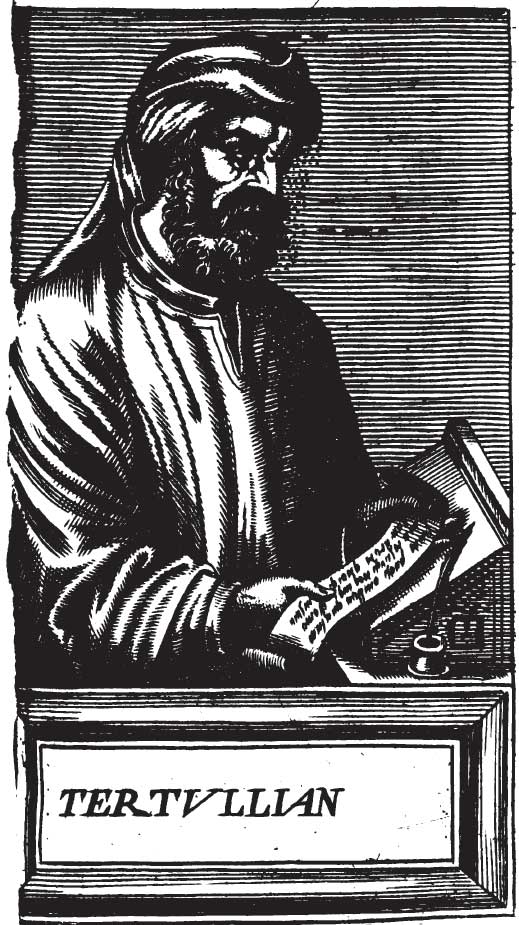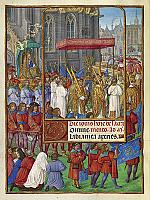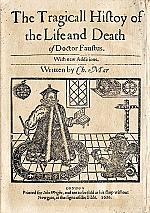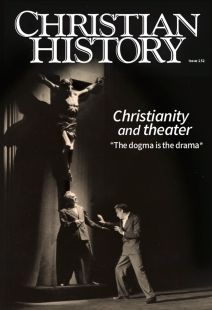“Not consistent with true religion”

[Above: Tertullian from, Andre Thevet's Histoire des plus ilustres et scavans hommes de leurs siecles,1671. Public domain.]
Tertullian penned one of Christianity’s oldest and most famous critiques of theatrical pursuits, On the Spectacles, around 200 AD.
You Servants of God, about to draw near to God, that you may make solemn consecration of yourselves to Him, seek well to understand the condition of faith, the reasons of the Truth, the laws of Christian Discipline, which forbid among other sins of the world, the pleasures of the public shows. . . .—from Chapter 1
The faith of some, either too simple or too scrupulous, demands direct authority from Scripture for giving up the shows, and holds out that the matter is a doubtful one, because such abstinence is not clearly and in words imposed upon God’s servants. Well, we never find it expressed with the same precision: You shall not enter circus or theater, you shall not look on combat or show; as it is plainly laid down, you shall not kill; you shall not worship an idol; you shall not commit adultery or fraud. But we find that that first word of David bears on this very sort of thing: Blessed, he says, is the man who has not gone into the assembly of the impious, nor stood in the way of sinners, nor sat in the seat of scorners.—from Chapter 3
You have festivals bearing the name of the great Mother and Apollo of Ceres too, and Neptune, and Jupiter Latiaris, and Flora, all celebrated for a common end; the others have their religious origin in the birthdays and solemnities of kings, in public successes in municipal holidays. There are also testamentary exhibitions, in which funeral honors are rendered to the memories of private persons; and this according to an institution of ancient times. . . .
But in the matter of idolatry, it makes no difference with us under what name or title it is practiced, while it has to do with the wicked spirits whom we abjure. If it is lawful to offer homage to the dead, it will be just as lawful to offer it to their gods: you have the same origin in both cases; there is the same idolatry; there is on our part the same solemn renunciation of all idolatry.—from Chapter 6
Never and nowhere is that free from blame which God ever condemns; never and nowhere is it right to do what you may not do at all times and in all places. It is the freedom of the truth from change of opinion and varying judgments which constitutes its perfection, and gives it its claims to full mastery, unchanging reverence, and faithful obedience. That which is really good or really evil cannot be ought else. But in all things the truth of God is immutable.—from Chapter 20
What nobler than to tread under foot the gods of the nations—to exorcise evil spirits—to perform cures—to seek divine revealings—to live to God? These are the pleasures, these the spectacles that befit Christian men—holy, everlasting, free. Count of these as your circus games, fix your eyes on the courses of the world, the gliding seasons, reckon up the periods of time, long for the goal of the final consummation, defend the societies of the churches, be startled at God’s signal, be roused up at the angel’s trump, glory in the palms of martyrdom.
If the literature of the stage delight you, we have literature in abundance of our own—plenty of verses, sentences, songs, proverbs; and these not fabulous, but true; not tricks of art, but plain realities. Would you have also fightings and wrestlings? Well, of these there is no lacking, and they are not of slight account. Behold unchastity overcome by chastity, perfidy slain by faithfulness, cruelty stricken by compassion, impudence thrown into the shade by modesty: these are the contests we have among us, and in these we win our crowns. Would you have something of blood too? You have Christ’s.—from Chapter 29
By Tertullian
[Christian History originally published this article in Christian History Issue #152 in 2024]
Tertullian was a third-century African theologianNext articles
Reforming drama
During religious change, English playwrights faced shifting attitudes about theater
Sarah R. A. WatersReading Christ between the lines
Christopher Marlowe and William Shakespeare wove Christian concepts into their works.
The editorsSupport us
Christian History Institute (CHI) is a non-profit Pennsylvania corporation founded in 1982. Your donations support the continuation of this ministry
Donate







